- Home
- Bladder cancer
- Advanced bladder cancer
Advanced bladder cancer
If bladder cancer has spread to other parts of the body, it is known as advanced or metastatic bladder cancer. Treatment will focus on controlling the cancer and relieving symptoms without trying to cure the disease. This is called palliative treatment.
Many people think that palliative treatment is only for people at the end of their life, but it may help people at any stage of advanced bladder cancer. It is about living as comfortably as possible and helping you to maintain your quality of life.
Learn more about these treatments for advanced cancer:
- Immunotherapy (checkpoint inhibitors)
- Systemic chemotherapy
- Surgery (TURBT)
- Surgery (cystectomy)
- Radiation therapy
- Palliative treatment
Immunotherapy (checkpoint inhibitors)
Immunotherapy uses the body’s own immune system to fight cancer. BCG is a type of immunotherapy treatment that has been used for many years to treat superficial bladder cancer.
A newer group of immunotherapy drugs called checkpoint inhibitors work by letting the immune system recognise and attack the cancer.
After a course of chemotherapy, some people with advanced bladder cancer may have immunotherapy with checkpoint inhibitor drugs such as pembrolizumab or avelumab. These drugs are given directly into a vein through a drip (infusion) and the treatment is repeated every 2–6 weeks. How many infusions you receive will depend on how you respond to the drug.
Side effects of immunotherapy
Like all treatments, checkpoint inhibitors can cause side effects. Because these drugs act on the immune system, they can sometimes cause the immune system to attack healthy cells in any part of the body.
This can lead to various side effects including:
- skin rash
- diarrhoea
- breathing problems
- inflammation of the liver
- hormone changes
- joint pain and temporary arthritis
- other problems.
Your doctor will discuss possible side effects with you.
For more on this, see our general section on Immunotherapy.
Systemic chemotherapy
Enfortumab vedotin is a new type of chemotherapy. Known as an antibody-drug conjugate (ADC), enfortumab vedotin targets a particular protein (called nectin-4) on cancer cells. You do not need to have tests to see if the cancer has this protein before having this drug.
Enfortumab vedotin may be used for people with advanced bladder cancer that has not responded to other types of systemic chemotherapy and immunotherapy. It is given in the same way as other types of systemic chemotherapy.
Side effects of enfortumab vedotin
These may include:
- skin rashes
- nausea and vomiting
- high blood sugar
- shortness of breath or trouble breathing
- eye problems such as blurred vision.
Let your treatment team know if you notice these or any other side effects.
For more on this, see our general section on Chemotherapy.
Some drugs may be available through clinical trials for people with bladder cancer that has come back or not responded to treatment. Ask your doctor about recent developments in drugs for bladder cancer and whether a clinical trial may be an option for you.
Radiation therapy
Radiation therapy can be used when the bladder cancer is advanced or has spread from the bladder to other areas in the body.
Palliative radiation therapy can be used to shrink the cancer in the bladder, to stop bleeding in the bladder and to help with pain that the cancer may be causing. It can also be directed at other parts of the body for symptoms such as pain from cancer that has spread to the bones.
The number of radiation therapy treatments needed ranges from a single treatment to several weeks of daily treatments. Each treatment session takes about 10–15 minutes.
Side effects of radiation therapy
The potential side effects will depend on which part of the body is being treated, but are usually mild.
For more on this, see our general section on Radiation therapy.
Palliative treatment
Palliative treatment is one aspect of palliative care, in which a team of health professionals aims to meet your physical, emotional, practical, cultural, social and spiritual needs. The palliative care team will work with your cancer specialists to manage side effects from treatment. The team also provides support to families and carers.
For more on this, see Palliative care and Living with advanced cancer.
→ READ MORE: Having a urinary diversion
Video: What is palliative care?
Find out how palliative treatment aims to manage symptoms and improve people’s quality of life without trying to cure the disease.
Podcast: Treatment Options for Advanced Cancer
Listen to more of our podcast for people affected by advanced cancer
More resources
Dr Prassannah Satasivam, Urologist and Robotic Surgeon, Epworth Hospitals and Cabrini Hospitals, VIC; Donna Clifford, Urology Nurse Practitioner, Royal Adelaide Hospital, SA; Marc Diocera, Genitourinary Nurse Consultant, Peter MacCallum Cancer Centre, VIC; Dr Renee Finnigan, Radiation Oncologist, Gold Coast University Hospital, QLD; Lisa Hann, 13 11 20 Consultant, Cancer Council SA; Dr Andrew Hirschhorn, Director of Allied Health and MQ Health Academy, MQ Health, Macquarie University, NSW; Anne Marie Lyons, Stomal Therapy Nurse, Concord Hospital and NSW Stoma Limited, NSW; John McDonald, Consumer; Prof Manish Patel, Urological Cancer and Robotic Surgeon, Westmead Hospital, Macquarie University Hospital, and The University of Sydney, NSW; Dr Jason Paterdis, Urological Surgeon, Brisbane Urology Clinic, QLD; Graeme Sissing, Consumer; Prof Martin Stockler, Medical Oncologist, The University of Sydney, Concord Cancer Centre, and Chris O’Brien Lifehouse RPA, NSW.
View the Cancer Council NSW editorial policy.
View all publications or call 13 11 20 for free printed copies.

